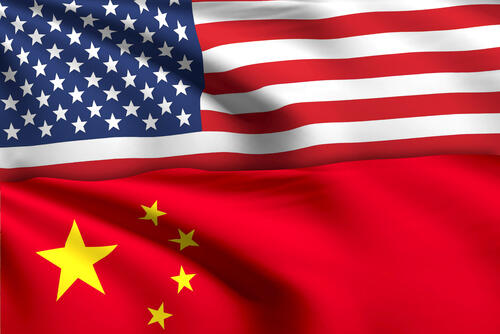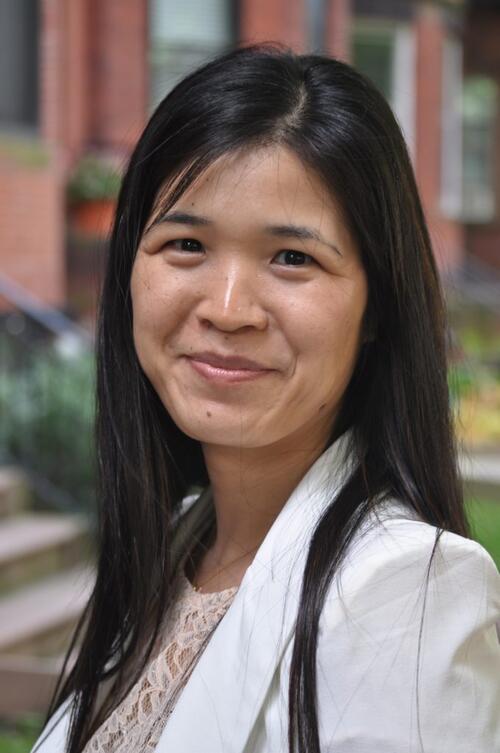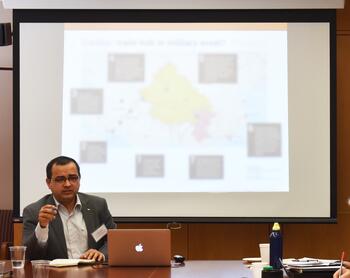The Stanford Center at Peking University (SCPKU), the Center on Democracy, Development and the Rule of Law (CDDRL), and the APARC China Program jointly hosted a workshop on China’s Belt and Road Initiative (BRI) in early March. The workshop, held on March 2 and 3, welcomed researchers from around the world with expertise in the Initiative. Unfortunately, because of the rapidly developing health emergency related to the coronavirus, participants from not only China, but also Japan, were prevented from attending. As described by Professor Jean Oi, founding director of SCPKU and the China Program, and Professor Francis Fukuyama, director of CDDRL and the Ford Dorsey Master's in International Policy, who co-chaired the workshop, the meeting aimed to provide a global perspective on the BRI, consolidate knowledge on this opaque topic, and determine the best method and resources for future research.
The workshop began with presentations from several of the invited guests. Dr. Atif Ansar from the University of Oxford’s Saïd Business School kicked off the first day by describing not only the tremendous opportunity that the BRI presents to developing economies, but also the serious pitfalls that often accompany colossal infrastructure projects. Pointing out the poor returns on investment of mega infrastructure projects, Ansar examined the frequest cost and schedule overruns, random disasters, and environmental degradation that outweigh the minimal benefits that they generally yield. China’s own track record from domestic infrastructure projects does little to mitigate fear of these risks, Ansar claimed. In response, he urged professional management of BRI investments, institutional reforms, and intensified deployment of technology in BRI projects. Dr. Ansar was followed by Dr. Xue Gong of the S. Rajaratnam School of International Studies, Nanyang Technological University, Singapore. Dr. Gong’s analysis centered on the extent to which China’s geopolitical motivations influenced its outward foreign direct investments (OFDI). Although her research was still in the early stages, her empirical analysis of China’s OFDI inflows into fifty BRI recipient countries from 2007-2018 nevertheless revealed that geopolitical factors often outweigh economic factors when it comes to China’s OFDI destinations.
Participants then heard presentations from
Amit Bhandari of Gateway House: Indian Council on Global Relations and
Professor Cheng-Chwee Kuik of the National University of Malaysia. Mr. Bhandari’s talk focused on Chinese investments in India’s six neighboring countries, which tend to center more on energy rather than connectivity projects. He first found that the investments are generally not economical for the host countries because they come with high costs and high interest rates. Secondly, he argued that these projects often lacked a clear economic rationale, appearing instead to embed a geopolitical logic not always friendly to India. Professor Kuik, by contrast, provided a counterexample in his analysis of BRI projects in Southeast Asia. He described how, in Southeast Asia, host countries’ reception of the BRI has varied substantially; and how various stakeholders, including states, sub-states and other entities, have used their leverage to shape outcomes more or less favorable to themselves. Kuik’s analysis injected complexity into the often black-and-white characterizations of the BRI. He highlighted the multidimensional dynamics that play out among local and state-level players in pursuit of their goals, and in the process of BRI implementation.
Professor Curtis J. Milhaupt and Scholar-in-Residence Jeffrey Ball, both at Stanford Law School, followed with individual presentations on the role of State-Owned Enterprises (SOEs) in the BRI and the emissions impact of the BRI on climate change, respectively. Professor Milhaupt characterized Chinese SOEs as both geopolitical and commercial actors, simultaneously charged with implementing Party policies and attaining corporate profits. Chinese SOEs are major undertakers of significant overseas BRI projects, acting not only as builders but also as investors, partners, and operators. This situation, Milhaupt asserted, carries significant risks for SOEs because these megaprojects often provide dismal returns, have high default rates, and can trigger political backlash in their localities. Milhaupt highlighted the importance of gathering firm-level data on businesses actually engaged in BRI projects to better infer geostrategic, financial, or other motivations. Jeffrey Ball turned the discussion to carbon emissions from BRI projects and presented preliminary findings from his four-country case studies. He concluded that, on aggregate, the emissions impact of the BRI is still “more brown than green.” Twenty-eight percent of global carbon emissions may be accounted for by BRI projects, Ball asserted, underscoring the importance of the BRI to the future of global climate change.
The day concluded with presentations by Michael Bennon, Managing Director at the Stanford Global Projects Center, and Professor David M. Lampton, Oksenberg-Rohlen Fellow at the Freeman Spogli Institute for International Studies. Bennon first presented findings from two empirical case studies of BRI projects and then went on to describe how the BRI is now practically the “only game in town” for infrastructure funding for developing countries. Lengthy environmental review processes at Western multilateral banks have turned the World Bank, for example, from a lending bank into a “knowledge bank,” he argued. He also highlighted that, in general, economic returns on BRI projects for China are very poor, even though recipient countries may accrue macroeconomic benefits from these projects. Finally, Professor Lampton turned the discussion back to Southeast Asia, where China is currently undertaking massive cross-border high-speed rail projects through eight ASEAN countries. He described how each host country had varying capacity to negotiate against its giant neighbor, and how the sequential implementation of these cross-border rail projects also had varying impacts on the negotiating positions of these host countries. BRI played out differently in each country, in other words, eliciting different reactions, push-backs and negotiated terms.
The second day of the workshop was dedicated to working toward a collaborative approach to future BRI research. The group discussed the key gaps in the existing research, including how to know what China’s true intentions are, how to measure those intentions, who the main players and their interests in both China and the host countries are, and even what the BRI is, exactly. Some cautioned that high-profile projects may not be representative of the whole. Participants brainstormed about existing and future sources of data, and stressed the importance of diversifying studies and seeking empirical evidence.






 Hau L. Lee is the Thoma Professor of Operations, Information and Technology at the Graduate School of Business at Stanford University. He was the founding faculty director of the Stanford Institute for Innovation in Developing Economies (SEED), and is the current Co-Director of the Stanford Value Chain Innovations Initiative. Professor Lee’s expertise is on global supply chain management and value chain innovations. He has published widely in top journals on supply chain management. He was inducted to the US National Academy of Engineering, and elected a Fellow of MSOM, POMS; and INFORMS. He was the previous Editor-in-Chief of Management Science. In 2006-7, he was the President of the Production and Operations Management Society. His article, “The Triple-A Supply Chain,” was the Second Place Winner of the McKinsey Award for the Best Paper in 2004 in the Harvard Business Review. In 2004, his co-authored paper in 1997, “Information Distortion in a Supply Chain: The Bullwhip Effect,” was voted as one of the ten most influential papers in the history of Management Science. His co-authored paper, “The Impact of Logistics Performance on Trade,” won the Wickham Skinner Best Paper Award by the Production and Operations Management Society in 2014. In 2003, he received the Harold Lardner Prize for International Distinction in Operations Research, Canadian Operations Research Society. Professor Lee obtained his
Hau L. Lee is the Thoma Professor of Operations, Information and Technology at the Graduate School of Business at Stanford University. He was the founding faculty director of the Stanford Institute for Innovation in Developing Economies (SEED), and is the current Co-Director of the Stanford Value Chain Innovations Initiative. Professor Lee’s expertise is on global supply chain management and value chain innovations. He has published widely in top journals on supply chain management. He was inducted to the US National Academy of Engineering, and elected a Fellow of MSOM, POMS; and INFORMS. He was the previous Editor-in-Chief of Management Science. In 2006-7, he was the President of the Production and Operations Management Society. His article, “The Triple-A Supply Chain,” was the Second Place Winner of the McKinsey Award for the Best Paper in 2004 in the Harvard Business Review. In 2004, his co-authored paper in 1997, “Information Distortion in a Supply Chain: The Bullwhip Effect,” was voted as one of the ten most influential papers in the history of Management Science. His co-authored paper, “The Impact of Logistics Performance on Trade,” won the Wickham Skinner Best Paper Award by the Production and Operations Management Society in 2014. In 2003, he received the Harold Lardner Prize for International Distinction in Operations Research, Canadian Operations Research Society. Professor Lee obtained his 








